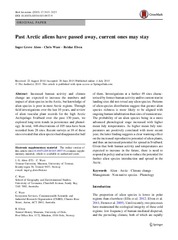Blar i forfatter Norges arktiske universitetsmuseum "Elven, Reidar"
-
Living on the edge: conservation genetics of seven thermophilous plant species in a high Arctic archipelago
Birkeland, Siri; Skjetne, Idunn Elisabeth Borgen; Brysting, Anne Krag; Elven, Reidar; Alsos, Inger Greve (Journal article; Tidsskriftartikkel; Peer reviewed, 2017-01-19)Small, isolated and/or peripheral populations are expected to harbour low levels of genetic variation and may therefore have reduced adaptability to environmental change, including climate warming. In the Arctic, global warming has already caused vegetation change across the region and is acting as a significant stressor on Arctic biodiversity. Many of the rare plants in the Arctic are relicts from ... -
Long-distance plant dispersal to North Atlantic islands: colonization routes and founder effect
Alsos, Inger Greve; Ehrich, Dorothee; Eidesen, Pernille Bronken; Solstad, Heidi Merethe; Westergaard, Kristine Bakke; Schonswetter, Peter; Tribsch, Andreas; Birkeland, Siri; Elven, Reidar; Brochmann, Christian (Journal article; Tidsskriftartikkel; Peer reviewed, 2015-04-15)Long-distance dispersal (LDD) processes influence the founder effect on islands.We use genetic data for 25 Atlantic species and similarities among regional floras to analyse colonization, and test whether the genetic founder effect on five islands is associated with dispersal distance, island size and species traits. Most species colonized postglacially via multiple dispersal events from several ... -
Past Arctic aliens have passed away, current ones may stay
Alsos, Inger Greve; Ware, Christopher; Elven, Reidar (Journal article; Tidsskriftartikkel; Peer reviewed, 2015-07-04)Increased human activity and climate change are expected to increase the numbers and impact of alien species in the Arctic, but knowledge of alien species is poor in most Arctic regions. Through field investigations over the last 10 years, and review of alien vascular plant records for the high Arctic Archipelago Svalbard over the past 130 years, we explored long term trends in persistence and ...


 English
English norsk
norsk

